Few games evoke retro gaming nostalgia quite like Secret of Mana. Released in 1993 for the Super Nintendo Entertainment System, this Squaresoft action-RPG is likely to have been the first RPG for many Western gamers. s. Secret of Mana begged to be a memorable experience with its vibrant graphics, memorable soundtrack , and co-op for up to three players. Not only is Secret of Mana one of the most beloved games in the Mana series, it’s so synonymous with the SNES that Nintendo included it as one of the 30 games in the SNES Classic Edition back in 2017.
The 2018 remake of Secret of Mana, however, received decidedly less fanfare than the game it was based on. While it is technically faithful to the SNES original, it features a polarizing graphical style, a controversial remastered soundtrack, and fully voiced dialogue that aimed a bit too high and fell too short of its goals. For a game with such a treasured legacy, this remake fell quite shy of many fans’ expectations
However, is it fair to say that the remake of Secret of Mana is bad? Is the original SNES version truly superior to the remake? Or are fans just blinded by nostalgia? What’s the best way to play Secret of Mana today?
To answer this question, let’s look at all the ways you can easily play Secret of Mana and discuss the pros and cons of each.
Secret of Mana (1993)
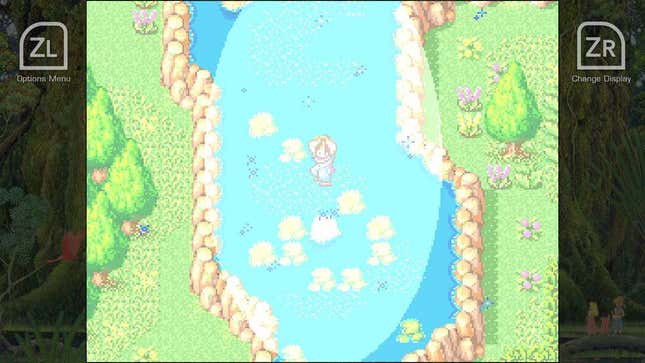
Play it on:: SNES, Switch (via the Collection of Mana), SNES Classic Edition. (Formerly available via the Wii Virtual Console)
Pros: The original version of Secret of Mana remains the most aesthetically cohesive version of the game you can find. The large sprites and bright color palette were dazzling back in the day, and truthfully, it still looks remarkably good today, especially on a nice vintage CRT. The music stretches the sound capabilities of the Super Nintendo to its limit to feel both whimsical yet melancholic in ways that even modern games rarely capture. Into The Thick Of It, the first major overworld theme, sounds so crisp you could confuse it with CD-quality audio.
I can’t stress enough how impressionable Secret of Mana’s aesthetic achievements are. It genuinely feels like a fairy tale come to life, especially when you see the emotive animations of monsters like the series’ trademark Rabite. The graphical style of Secret of Mana conveys the scale of the adventure you’re sharing with the protagonist Randi. The scope of the world increases as you play through the game, with the cities in the second half of the game featuring grand architecture unlike the small towns you start in. The snowy forest feels otherworldly, especially accompanied by its accompanying music. And the full moon of the game’s ending screen still conveys so many bittersweet emotions without using any words at all.
All of this combines into an adventure that feels sweeping and epic, despite the limitations of its hardware.
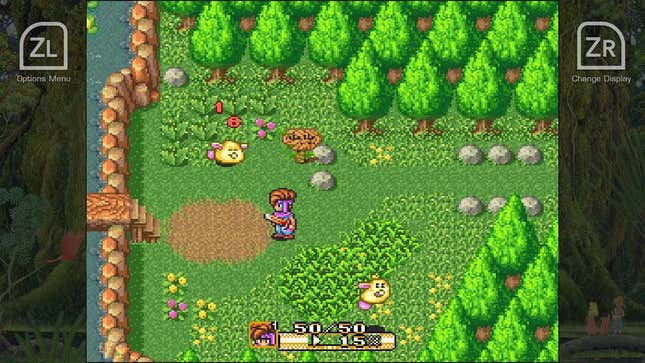
Cons: As much as I love the original Secret of Mana, there is no denying that this is a seriously janky game. It’s best to consider Secret of Mana as less an Action RPG and more a turn-based game with some action elements. Characters need to wait to use physical attacks to inflict respectable damage, mimicking the trademark ATB gauge that became prominent in the mainline Final Fantasy series. Meanwhile, magic commands can only be used via a menu system, completely stopping the action while you make your selection.
The underlying mechanics of Secret of Mana can be an acquired taste, especially for modern gamers and the original the SNES version often feels like it can’t keep pace with its own action. You’ll often “stack” attacks as spell and attack animations play out on enemies, causing you to wait around while you wait for your hits to register. And frustratingly, your attacks sometimes won’t land at all for seemingly no reason.
Honing in on magic attacks can circumvent these issues, but this presents its own minor annoyances. Similar to Final Fantasy II, players have to level up their magic via repeated use to deal respectable damage. However, since Magic Points are a semi-limited resource, this typically involves repetitive grinding while you’re parked near an inn. Meanwhile, once you do level up your magic, you’ll start resolving boss encounters by spamming spells from your menu and stunlocking them. Secret of Mana rarely feels like a balanced game.
There are other annoyances players will contend with outside of combat. Party members must always remain on screen, and AI-controlled allies can often get stuck on certain map tiles and prevent your progress. The sprint function is a mess as it depletes your attack gauge and it only lets you run in a single direction (stairs halt your progress too). These aren’t game breaking issues, but they do add up over the course of a ~20 hour playthrough. But given how ambitious Secret of Mana is relative to other RPGs in 1993, it’s easy to cut it some slack.
Secret of Mana (2018 Remake)
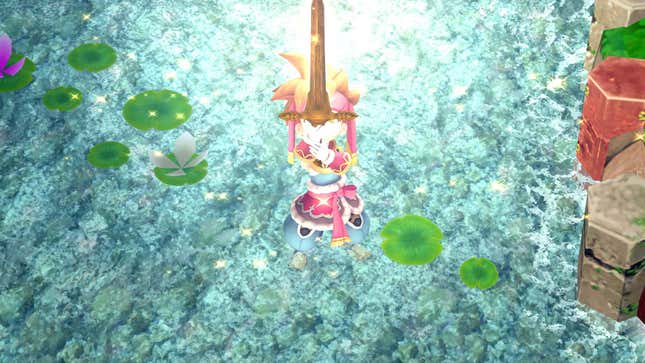
Play it on: PS5, PS44, PS Vita, Windows (Steam Deck YMMV)
Pros: Released 25 years after the SNES version of the game, the Secret of Mana remake does an admirable job of preserving the original play experience while softening some of its rough edges. Moving from 2D to full 3D, characters can now move and attack in a full 360 degrees. This naturally makes movement a bit smoother, and it also gives clear visual feedback of your weapon’s attack range. Attacks still “stack” in this version of the game, but at least your strikes seem to connect more often than they did in the original.
The Secret of Mana remake also does a great job addressing the original game’s smaller issues. AI party members no longer need to be babysat whenever they get stuck. You don’t need to keep them on screen. Leveling up magic is faster, and since players can hold up to 12 of each item, recovering Magic Points is much easier. Sprinting actually works the way you’d expect it to, letting you quickly traverse large distances without totally depleting your attack gauge.
Aside from these improvements, the remake adds new stuff too. Whenever the party sleeps at an inn, you’ll now see a short skit play out as the characters discuss the adventure so far. It’s easier to swap weapons between your party members using the updated menu system. Spells can be assigned to hotkeys, so you don’t need to interrupt the action as often. From a gameplay perspective, there’s a lot to love in the Secret of Mana remake.
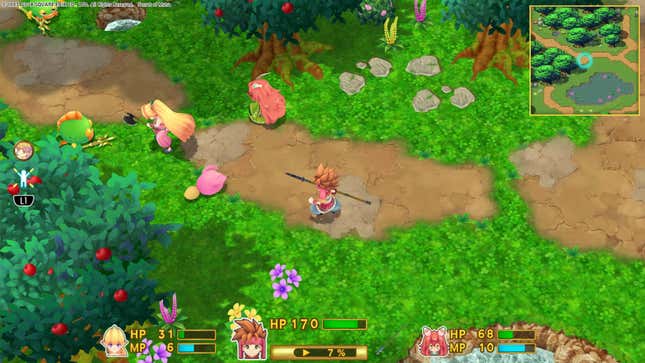
Cons: Let’s address the elephant in the room: the graphics. No, they’re not all bad, but there are some issues. The character models look pretty nice, even if their mouths don’t move during cutscenes. However, there’s no mistaking that Secret of Mana 2018’s visual style feels cheap. While it’s faithful to the SNES version on paper, the graphical spectacle that made the original game feel so grand almost completely flattens out here.
This isn’t just a subjective argument; some of the visual flourishes from the original game are wholesale erased or just lacking in consistent quality. The iconic cannon travel cutscene that shows the party flying across the world is totally gone. The animation of the party mounting their flying companion is massively desynced from the audio. The ring menu no longer centers around the targeted party member, presumably due to how characters can now linger off-screen. These less-satisfactory elements blunt the improvements of the gameplay mentioned above.
Fortunately, while the remastered soundtrack might fail to impress fans of the original, you can revert it to the original game’s score (and you should).
The remake’s problems aren’t just aesthetic issues either. For as many gameplay issues as the remake fixes from the original game, it unfortunately introduces new problems that the SNES version never had. For instance, now that the game tracks off-screen action, enemies that use projectiles can now spam attacks at the player, causing some cheap deaths in the early game.
The remake does feel less janky than the SNES game overall, but it’s still janky by modern standards. And when playing the remake on a modern console or decently specced PC, Secret of Mana’s shortcomings feel more glaring given that it’s not aiming for GPU-melting visual flair. The remake offers little argument for changing the original aesthetics of the 1993 original.
Secret of Mana (Mobile Version)
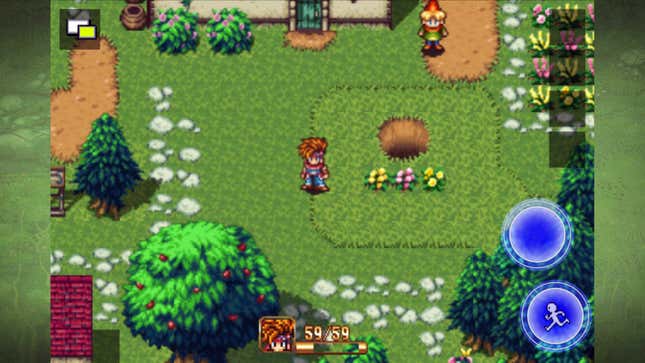
Play it on: iOS, Android
Pros: Yes, even though the Secret of Mana remake arguably looks like a mobile game to begin with, there is also a separate mobile version of the game that dates back to approximately 2009. And, despite what you may think at first glance, this mobile version is not a mere port of the SNES game. Secret of Mana on mobile features some new graphical effects, redrawn sprites, and updated 360 degree movement. The UI has also received some work to support touch controls.
Considering its vintage, this port of Secret of Mana has some impressive qualities for its time. The fact that it still runs on modern devices is impressive, especially considering how many Square Enix mobile games have been delisted completely. It’s a decent way to experience this classic RPG if you only have access to a mobile device, and it’s relatively cheap too.
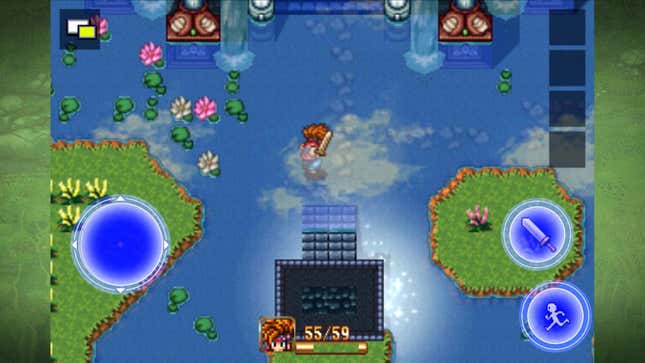
Cons: “Decent” is not the same as “advisable.” As a port as old as the original version of Angry Birds, you can tell the mobile version of Secret of Mana predates the rise of modern smartphones. The framerate is very stuttery, no matter what device you own. The graphics, while updated in some cases, look blurry and lack the polish of the original game. Sound effects also sound compressed in this version And the generic font used in dialogue clashes with the style of everything else on screen.
You can play the mobile version with an iPhone or Android gamepad. That’s impressive, but, if you actually try to play this game using something like the Backbone, you’ll only become more keenly aware of how rough this version of the game is. I’ve defeated the first Mantis boss of Secret of Mana around 25 times over the course of my life, and I legitimately struggled to take it down in the mobile version of the game. Something is just off with the controls here.
While I am impressed Square Enix has continued to keep this version of Secret of Mana playable, the game’s age may become an issue depending on your device. It hasn’t received an update in four years as of writing, and there’s no guarantee a port this old will remain usable in the future. Considering the SNES version of Secret of Mana is now technically playable on mobile devices thanks to the release of the Delta emulator, this mobile port doesn’t even qualify as the best way to play the game on the go. I’d only recommend this version of Secret of Mana to hardcore Mana fans with insatiable curiosity.
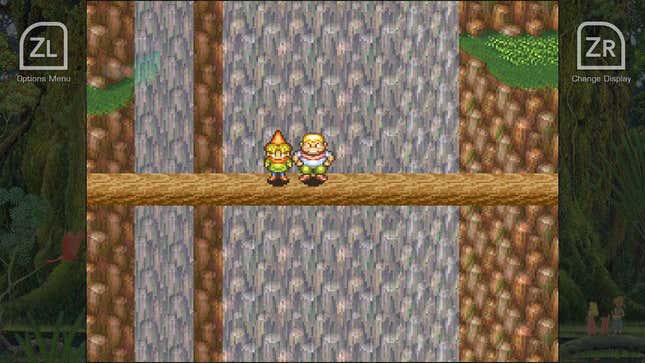
Which version of Secret of Mana is the best?
The original Super Nintendo version of Secret of Mana remains the best iteration of the game to this day. So much of Secret of Mana’s endearing legacy comes from the sum of all its parts, and diminishing any of those pieces reduces the charm that made the game so memorable to begin with. Even with its minor annoyances, the best way to understand why Secret of Mana is so special is to play the original version of the game.
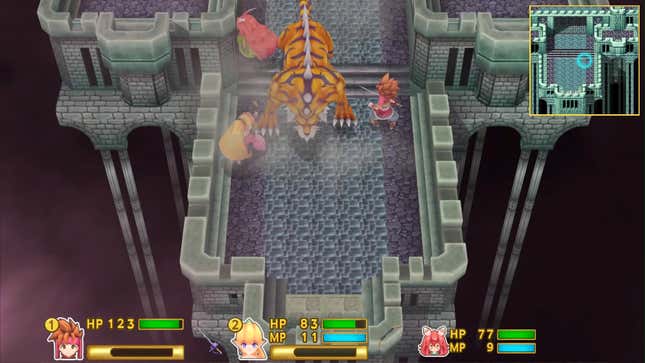
Having said that, if you played Secret of Mana previously and want an excuse to replay it, the remake is worth a playthrough. There’s no mistaking that the remake has its shortcomings, but it shouldn’t be completely dismissed. In fact, after replaying the Secret of Mana remake myself, I was surprised by just how fast I was engrossed in the game all over again. The quality of life upgrades are very nice, and the extra inn skits are a lot of fun for old school Mana fans. It’s currently available as part of PlayStation Plus Premium, so if you have an active subscription to that, you’ve got nothing to lose by giving it a shot.
If you’ll only play Secret of Mana once, play the original. If you want to play it twice, give the remake a shot afterwards. And if you want to play it three times, play anything but the mobile version of the game. Popoi deserves better than that.
.


